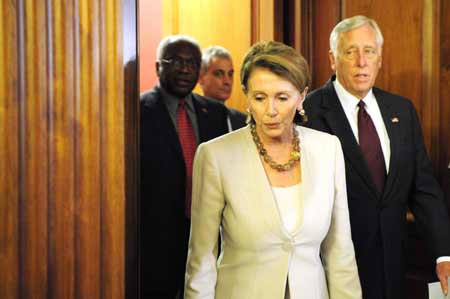The U.S. House of Representatives rejected Monday the 700-billion-dollar financial rescue legislation, which Bush Administration said is "urgently needed to address a crisis in our financial system that threatens the entire U.S. economy."
 US bailout plan gets "No" vote
US bailout plan gets "No" vote
The bill was rejected by a vote of 228-205. Leaders in the House said they might reconsider the bill on Thursday, as the Senate had planned a vote on the measure on Wednesday.
According to preliminary calculations, the Dow fell 777.68, or 6.98 percent, to 10,365.45, the largest one-day point drop.
The White House reacted immediately. President George W. Bush told reporters that he was disappointed at the House's rejection, vowing to "address this economic situation head on."
|

|
|
U.S.House of Representatives Speaker Nancy Pelosi (C),(D-Calif.) arrives at a news conference on Capitol Hill in Washington, Monday, Sept. 29, 2008, after the failed House vote on the financial bailout package.?[Xinhua] |
White House Spokesman Tony Fratto said before the vote Bush called a list of a "couple dozen" lawmakers to rally support for the rescue bill.
Under the bill, the government could get 250 billion dollars immediately, 100 billion dollars more if the president certified it was necessary, and the last 350 billion dollars with a separate certification and subject to a congressional resolution of disapproval.
However, the largest bailout plan since the Great Depression in 1930s was turned down by over two-thirds of republicans and 40 percent of Democrats.
Representative Darrel Issa, said he was "resolute" in his opposition to the measure because it would betray party principles and amount to "a coffin on top of Ronald Reagan's coffin."
Congresswoman Lynn Woolsey also voiced her opposition against the bill, noting taxpayers were being asked to pay for wild irresponsibility by America's top finance firms.
Trying to calm the stunned investors, a Treasury spokeswoman vowed the U.S. government will use "all tools at our disposal" to protect the U.S. financial markets and the economy.
Treasury Secretary Henry Paulson, an advocate of the rescue plan, "will be consulting with the president, the chairman of the Federal Reserve, and congressional leaders on next steps," said Treasury spokeswoman Michele Davi.
Meanwhile, House Speaker Nancy Pelosi said the Congress rejection of the 700-billion-dollar bailout plan "cannot stand" and that Congress would press ahead on a rescue plan.
Two White House hopefuls, Republican Senator John McCain and Democratic Senator Barack Obama, supported the bailout plan.
"This is something that all of us will swallow hard and go forward with," said McCain on Sunday, adding "The option of doing nothing is simply not an acceptable option, noting the plan was vital to rescuing the troubled American economy.
Obama also expressed confidence that a rejected bailout package would still get through Congress and urged markets to stay calm.
The Democratic presidential candidate, who was pushing very hard and involved in shaping those provisions of bill Sunday, said he had been on the telephone with Treasury Secretary Henry Paulson and House of Representatives Speaker Nancy Pelosi along with other congressional leaders.
"It's important for the markets to stay calm because things are never smooth in Congress and to understand that it will get done," he stressed.
(Xinhua News Agency September 30, 2008)